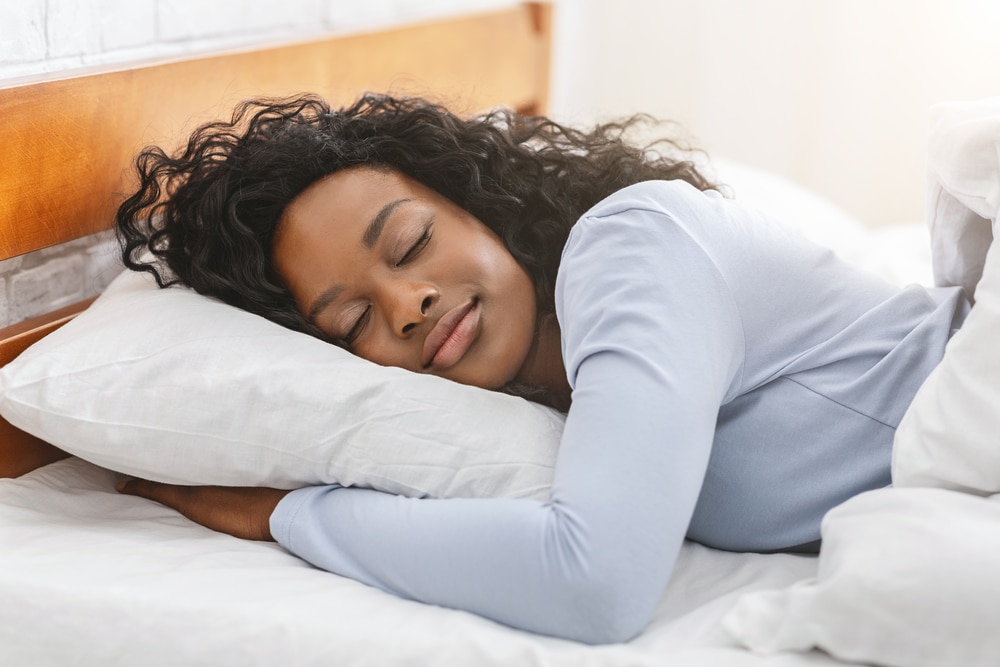People in the United States have more trouble sleeping than those in many other countries. In fact, the National Library of Medicine recently estimated that 56% of Americans struggle with sleep problems, which is 25% higher than Western Europeans and almost twice as high as people in Japan.
Sleep problems have a severe impact on quality of life and can lead to serious health problems. According to the National Institute of Health (NIH), people who struggle to get quality sleep are at an increased risk of:
- Heart attack
- Stroke
- Diabetes
- Hypertension
- Depression
- Obesity
Fortunately, people can better their health and enjoy more quality sleep by improving their sleep hygiene.

What Is Sleep Hygiene?
Sleep hygiene refers to all of the habits and behaviors that promote or diminish sleep quality. A lot of people who struggle to get quality sleep are unknowingly sabotaging themselves each and every night.
How Does Sleep Hygiene Impact Your Overall Health?
Quality sleep is an integral part of overall health. In addition to being linked to cardiovascular conditions and obesity, sleep difficulties are also associated with stress and mental health.
According to Harvard Medical School, 50% to 80% of patients in a common psychiatric practice suffer from chronic sleep problems, which is substantially higher than in the general population. The American Psychological Association (APA) has stated that poor sleep or sleep deprivation can significantly affect judgment, mood and memory.
Good sleep hygiene also helps people stay focused and alert; people who experience sleep difficulties are less productive at work, have an increased risk of traffic accidents and a higher chance of developing depression.
Sleep has other far-reaching health implications. Michael Twery, an NIH sleep expert, notes that sleep impacts almost every tissue in the human body. According to Twery, sleep also affects:
- Growth and stress hormones
- Appetite
- Breathing
- Blood pressure
- Immune system
- Higher reasoning skills
Some studies have found that the lack of sleep can reduce the efficacy of vaccines and make people more susceptible to infections.
As you can see, sleep hygiene plays a role in nearly every facet of physical and mental health.
How To Improve Sleep Hygiene
Several factors comprise sleep hygiene; improving one or all of them can help tremendously in getting a better night’s sleep and reducing daytime sleepiness. Here are some quick tips and you can read more about improving your sleep hygiene.
Keep a Consistent Schedule
Sticking to a sleep schedule, even on your days off, reinforces your body’s internal clock, which can reduce the time you spend trying to fall asleep and keep you from waking up prematurely. Whatever bedtime you choose, make sure it allows you to get at least seven hours of sleep each night.
Avoid Taking Naps
It can be tempting to take a nap in the afternoon, but you really should avoid it if you can. Napping can leave you feeling groggy and make it harder to fall asleep when bedtime comes.

If you do feel the need to take a nap, experts recommend keeping it relatively short. Ideally, naps should only last about 30 to 90 minutes.
Additionally, a recent study in Hypertension, a peer-reviewed journal published on behalf of the American Heart Association, found that regular napping increases the risk of high blood pressure by 12% and ischemic stroke by 24%.
Avoid Excessive Coffee and Alcohol Consumption
Most Americans love a good cup of java. The National Coffee Association estimates that 64% of American adults drink coffee on a daily basis. Still, excessive caffeine consumption often has a detrimental impact on sleep quality.

Everybody handles caffeine differently, but, on average, its effects last between three and seven hours. To avoid your coffee intake from interfering with your sleep, it’s best to keep it to the morning hours.
You should also limit the amount of alcohol you drink. While alcohol might help you fall asleep faster, it negatively impacts your sleep. According to The New York Times, alcohol consumption fragments the normal phases of light and deep sleep. In the second half of the night, the alcohol in your bloodstream begins to dissipate, which has an activating effect and can make you toss and turn.
Alcohol is also a diuretic, so it may cause you to wake in the middle of the night to urinate.
Examine Your Eating Habits
Researchers are still studying the relationship between diet and sleep, but it’s clear that there is a relationship. According to the NIH, diets high in carbohydrates, tryptophan, melatonin and phytonutrients are associated with improved sleep quality.
For the vast majority of Americans, dinner is the largest meal of the day. Some researchers contend that this is not a good practice; loading yourself up with energy before bedtime may be a large part of your sleep difficulties. Increasing the size of your breakfast or lunch and decreasing the size of your dinner may help you sleep better; it could also help you shed a few of those extra pounds.
Get More Exercise
Whether it’s due to laziness or the fast pace of life these days, a lot of Americans struggle with getting the exercise they need. The Centers for Disease Control and Prevention (CDC) states that 60% of American adults don’t get the recommended amount of exercise, and 25% aren’t physically active at all.
In addition to reducing the risk of cardiovascular conditions, regular exercise can significantly improve your sleep quality. The exercise doesn’t have to be rigorous; just 30 minutes of aerobic exercise daily can help you sleep better.
You should, however, try to avoid exercise right before bedtime because it raises your body temperature and may give you unwanted energy.
Avoid Electronic Devices
It can be tempting to watch television or read news stories on your phone or tablet before bed, but it’s counterproductive on two fronts:
Firstly, electronics are distracting. It’s easy to tell yourself you’ll go to sleep after one more episode, and it’s just as easy to say that again when the episode is over, which is especially true in the age of binge watching.
Secondly, the blue light emitted by modern electronics can reduce the level of melatonin in your brain, the chemical that controls your body’s sleep and wake cycles. You should try to cease your exposure to electronic devices at least an hour before bedtime. Instead, you may want to opt for reading, meditating or light stretching.
Frequently Asked Questions
Sleep is quite the phenomenon, one which even experts don’t yet fully understand. Nonetheless, there are a lot of things science has revealed about sleep and many common questions that do have definitive answers.
What Is REM Sleep, and How Much of It Do You Need?
Rem stands for rapid eye movement, which is just one of several stages of sleep. There’s really no consensus among sleep scientists as to how much REM sleep you need, but experts agree that about 20% to 25% of your total sleep is REM.
Most of your dreams occur during Rem sleep, though, and the National Institute of Neurological Disorders and Stroke states that dreams help people process their emotions and solidify certain memories.
Why Do They Call It Sleep Hygiene?
There are many aspects to hygiene: There’s oral hygiene, basic grooming, food hygiene, etc., and they all contribute to your overall health. Likewise, there are a lot of factors that determine how well you sleep, which is why they call it sleep hygiene.
What Is the Most Important Aspect of Sleep Hygiene?
There isn’t really one aspect of sleep hygiene that you should prioritize over all of the others. Rather, the different aspects of sleep hygiene are cumulative; the more healthy habits you can form, the better your overall sleep quality will be.
At What Time Should You Fall Asleep?
This will largely depend upon your schedule, but it’s important to keep in mind that your body’s internal clock is closely tied to natural light. Of course, it may not be prudent to go to bed at 6:00 p.m. in the wintertime. Still, if you can, you should try to wind down when it starts to get dark.
The Takeaway
Experts don’t have it all figured out yet, but they know that sleep is crucial to people’s physical and mental well being. Developing healthy habits can improve sleep, combat daytime sleepiness and reduce the risk of serious health problems.
By watching your diet, exercising regularly, avoiding long naps, limiting caffeine and alcohol consumption and avoiding electronics before bedtime, you can fall asleep faster, stay asleep longer and enjoy better sleep quality.







